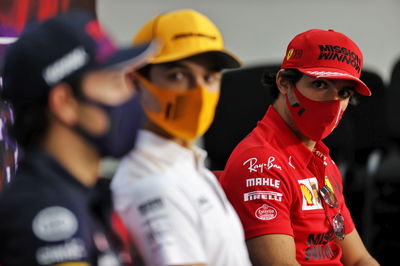Perez and Sainz take up Bahrain’s F1 COVID-19 vaccine offer

Red Bull’s Sergio Perez and Ferrari’s Carlos Sainz are the first Formula 1 drivers to reveal they have taken up Bahrain’s offer of COVID-19 vaccinations.
Ahead of pre-season testing and the season-opener at the Bahrain International Circuit, the Gulf Kingdom announced it would be offering the Pfizer-BioNTech vaccine to all F1 arrivals into the country.
While British-based teams were initially reported to have rejected this offer, it has since emerged that 90 percent of Ferrari’s team members had received the Pfizer vaccine.
Speaking during their first media appearances of pre-season testing, Perez and Sainz both confirmed they had been vaccinated against coronavirus.
“We got offered [it], and I took the decision to take it,” Perez revealed.
“For me, back in Mexico, I don't know when I will be able to get it, so I think [it] was very nice from Bahrain to offer that to us. And, yeah, I took it myself.”
New Ferrari signing Sainz added: “Yes, same as Checo, I did take it.
“I think it was a great opportunity and obviously thankful for the Bahrain government for offering it to so many people that travel around the world and, yeah, happy with it.”

McLaren’s Lando Norris stressed the matter was private for the individuals involved but said he was yet to make a final decision about receiving the vaccine.
“It is obviously private information with what everyone does within a team and for myself but for now I'm healthy and I'm staying where I am,” Norris said.
New F1 CEO and president Stefano Domenicali previously insisted that the championship was reluctant to ‘queue jump’ the most vulnerable in order to protect its staff.

![Toprak Razgatlioglu, ROKiT BMW Motorrad, BMW M 1000 RR [Gold & Goose]](https://cdn.crash.net/2024-09/GnG_1165424_HiRes.jpg?height=90)






![Johann Zarco, LCR, Honda RC213V, 2024 San Marino MotoGP, Misano, action [Gold & Goose]](https://cdn.crash.net/2024-09/GnG_1166323_HiRes.jpg?height=90)

![Jack Miller, KTM Factory Racing, KTM RC16, San Marino MotoGP, Misano, action [Gold & Goose]](https://cdn.crash.net/2024-09/GnG_1167624_HiRes.jpg?height=90)